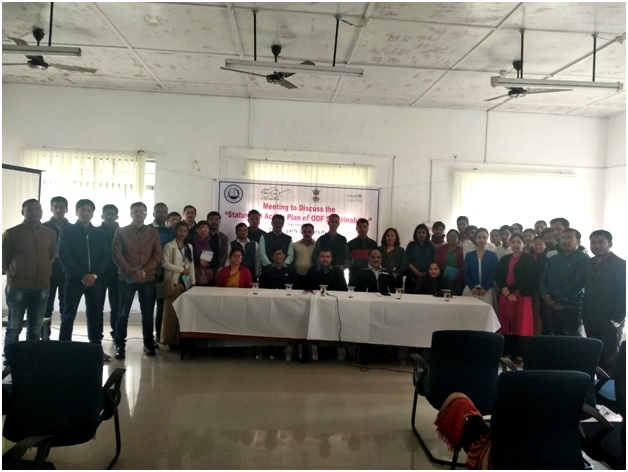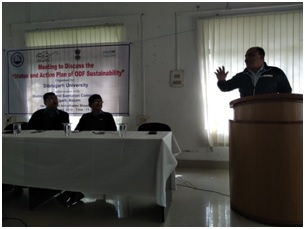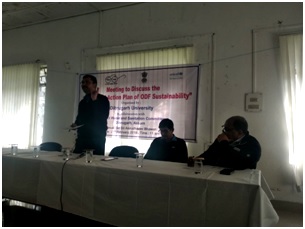The Dibrugarh University (DU) Swachh Bharat Mission (SBM) Team organized a meeting on Status and Action Plan of ODF Sustainability at the Conference Hall of Centre for Women Studies, on Feb’ 27 in collaboration with District Water and Sanitation Committee (DWSC). A discussion in this regard was held on the theme of “Status and Action Plan of ODF Sustainability” among the invited Speakers, College Nodal Teachers and Student Coordinators.
The meeting was presided over by Director College Development Council (CDC), Dr. Rupam Saikia and was attended by Guest of Honor, Dean Student Affairs, Dr. Jiten Hazarika; Executive Engineer PHED, Bhaskarjyoti Sarmah; DU SBM Nodal Officer, Dr. Shukla Acharjee; IEC Consultant PHED, Purabi Sarmah and University Health & Sanitation Club Members (UHSC) and College Health & Sanitation Club Members.
Addressing the discussion which was presided over by Dr. Rupam Saikia , Executive Engineer PHED, Sri Bhaskarjyoti Sarmah talked at length about how the role of students is inevitable in reaching the target areas of Swachhta and ODF Plus. In his speech, Sri Sarmah highlighted the core quarters of the programs planned to be undertaken that includes formation of 20 member student groups for survey to be conducted on cleanliness of Dibrugarh town, to identify littering spots in 22 Wards areas of the town, for converting them into beautification spots by involvement of communities. The information on bio medical wastes disposed by hospitals, food waste disposed by hotels and restaurants, fast food corners; pan shop and hair salon wastes, are to be collected by the students during the field study.
In the discussion that was based on measurable outcome of ODF, Sri Bhaskarjoti Sarmah suggested a few proposals for colleges such as to – a) Create Garbage disposal points in every College of Dibrugarh District; b) Minimize the gap between construction and usage of toilets, adoption of village / GP’s by students for keeping constant feedback; c) Increase the number of Swachgarhis’ by motivating students for sensitization on Sanitation, d) CHSC members should encourage students / parents / known persons within the college locality on hygiene and sanitation; e) University should act as solution provider for development of low cost technology to find easy solutions at tea gardens on bad effects of local liquor consumption, biodegradable components disposal mechanisms of wastes from rural market areas which can be decomposed within college campus for converting waste into resources, f) selection of area after preparing a road map by student coordinators for reaching collective sanitation goals; g) Creation of college student groups for conducting survey in Hospitals and Dispensaries for recording the number of registered cases of water borne diseases like diarrhea and dysentery. Mr. Sarmah concluded his speech by mentioning the pillars of sustainability – 1) Hygiene practices (personal & collective); 2) Feedback (bothway) and 3) Monitoring and Evaluation.
Speaking on the occasion, Prof Jiten Hazarika urged upon the stakeholders of SBM to make small groups among students’, to educate village people, develop skill to motivate positive thinking. For a swachh society it’s indispensable to have a swachh soul and mind. Dr. Hazarika emphasized that swachhta is the key to healthy long life He said we all must work together for a day to come when we would never talk about defecation issues.
In the concluding session of the discussion, brief reports of work undertaken under SBM was presented by Chief Coordinator SBM DU, Meghalee Chetia, individual College Nodal Teachers and Student Coordinators of the District who participated in the meeting.
Later, queries on fund release procedure were taken up and an announcement was made on Swachh College Award that would be declared by PHED & DU for which guidelines would be provided.
The president’s remark was given towards the end session and in his remark, Dr. Saikia suggested the plantation of Banana trees and promotion of this industry, Use and promotion of mud vessels, adoption of new resolutions for waste collection distribution centre; Use of human resource, construction of toilets in rural colleges; awareness on pure drinking water facilities in colleges.
Earlier, the welcome speech was delivered by SBM DU Nodal Officer, Dr. Shukla Acharjee, while the vote of thanks was given away by Chief Coordinator SBM DU, Ujjaini Sharma.






